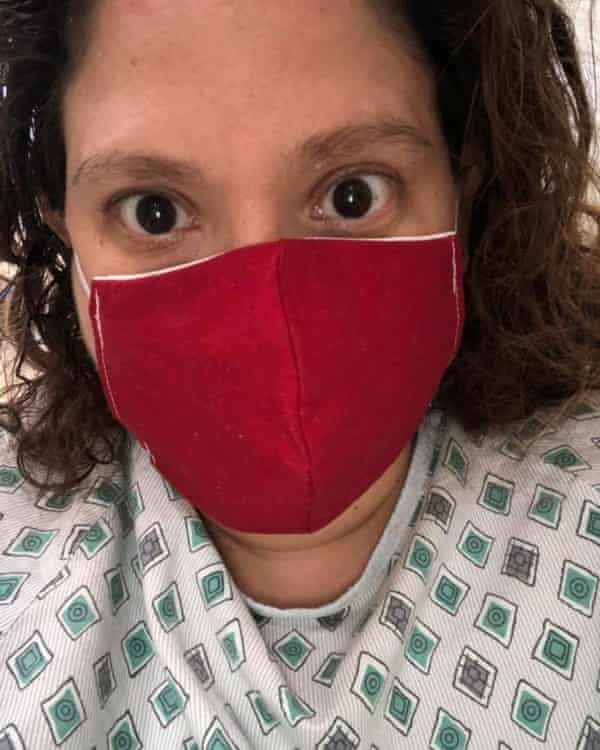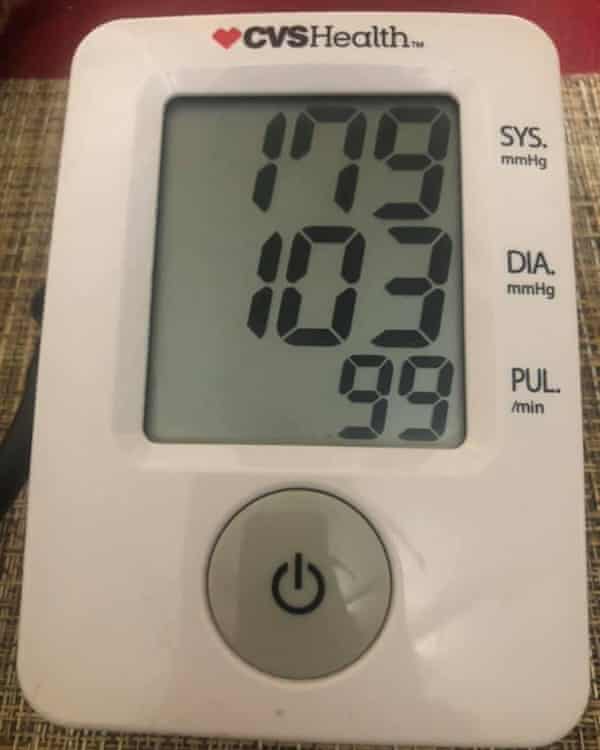Few things in Mariana Pineda’s body have worked properly since she was hospitalized with Covid-19 and pneumonia last April. One day she is seeing a specialist to get nodules on her thyroid biopsied, another day it is a trip to the emergency room after her hands swell and turn red, symptoms of yet another high blood pressure crisis.
She pays $3,062.48 a month for health insurance to cover this constant stream of treatment, which she can only afford with the help of a GoFundMe online fundraiser. She is too sick to work and is a single mother – her only income is child support payments.
Amid all of this, when Pineda’s finished with doctors’ appointments for the day and her four-year-old is asleep, she uses her last stores of energy to fight for the government-run healthcare program Medicare for All and its New York state equivalent.
“This is my gift from the universe,” Pineda told the Guardian. “If nothing else, the fact that I didn’t die from Covid just ramped up my overwhelming desire to get Medicare for All and the New York Health Act.”
Pineda is one of the many activists, and lawmakers, making Covid-19 part of their calls to reshape the US healthcare system to provide universal coverage. In mid-March, Democratic representatives Pramila Jayapal and Debbie Dingell reintroduced the Medicare for All act on the anniversary of Covid-19 being confirmed in all 50 states and Washington DC.

“There is a solution to this health crisis – a popular one that guarantees health care to every person as a human right and finally puts people over profits and care over corporations,” Jayapal said in a statement. “That solution is Medicare for All.”
The bill has the support of more than half the Democrats, but it is unlikely to pass the House. In the Senate, several Democrats instead are pushing for the public option, a government-run health insurance to exist alongside private health insurance.
Both reforms seek to make health insurance more affordable, easier to access and less costly and are being weighed by several state governments.
The hurdles, however, are immense.
Partnership for America’s Health Care Future, a lobby which represents hospitals, pharmaceutical companies and health insurers, is already spending millions to campaign against reform. In Colorado, the group bought $1m in TV ads to run this spring before a bill was even introduced.
These ads, which warn of politicians having more control over people’s healthcare, have been effective against health reform for decades, explained health policy expert Colleen Grogan. “The evidence from the past suggests that those advertisements really work and that’s why they keep doing them,” said Grogan, professor at the University of Chicago’s Crown Family School of Social Work, Policy and Practice.
Americans for Prosperity, a group with financial backing from the conservative Koch brothers network, is also stepping in. The group spent millions to fight the ACA, and told CNBC in March that that campaign failed in part because they didn’t present an alternative. This time, the group is showcasing a “personal option” plan which would slash regulations and is pitched toward the private sector.
Activists must also contend with the more moderate wing of the Democratic party. Joe Biden has not endorsed Medicare for All and his healthcare efforts have so far been focused on expanding the Affordable Care Act (ACA).
The president has already had success: the last stimulus package included $61.3bn to expand insurance subsidies and coverage under the ACA and other federal programs for two years. More than four out of 10 people without health insurance are now eligible for a free or nearly free health plan, according to a Kaiser Family Foundation analysis.
Pineda is set to benefit from one of the changes: people who have recently lost work must be covered for up to six months under the usually costly Cobra program. That’s the insurance Pineda pays $3,000 a month for now and she’s waiting to hear from her employer or the government about the subsidy.
These efforts improve access and affordability, but also direct public money to the private healthcare industry. “So the American public benefits but the American public also loses because it ends up having to pay a lot more than a more rational system should really pay for,” Grogan said.
Should Biden attempt to make these changes permanent, as is expected, discussions about public spending on private healthcare could be more prominent, a useful tool for reform activists. In 2019, federal, state and local governments accounted for 45% of the country’s $3.8tn in healthcare spending.
“The interest in containing healthcare spending is not going away,” said Katherine Hempstead, senior policy adviser at the Robert Wood Johnson Foundation. “I don’t think we’re going to hear the end of that at all.”
And Pineda will do what she can to ensure that.
The mother of four posts pictures of her vital signs and medical bills on social media, providing an intimate look at the long-term symptoms some people experience after Covid-19 infections and the costs of trying to stay alive.

“I’ve done panels from hospital beds, I’ve gone on Facebook Live from the emergency room,” Pineda said. “Yes, it sucks that I am sick, but it gives me a unique insight and gives me access to all kinds of things that we might not necessarily know about.”
Pineda is energetic and quick to laugh, but she is experiencing a nightmare. Her symptoms include headaches that make her feel like someone is shaking a can of coins in her head, vomiting multiple times a week, emphysema, lesions on her kidneys, incontinence and anemia. Her period hasn’t stopped since she had a miscarriage in July. Doctors are monitoring an air sack in her lungs because if it grows much more it will need to be surgically removed.
She goes to the emergency room almost every month and in September had emergency surgery to remove six blood clots in her lungs, including one blocking her pulmonary artery – the respiratory therapist told her 99% of the people in her position don’t survive.
She is seeing a urologist, pulmonologist, endocrinologist, hematologist, gastroenterologist, neurologist and cardiologist. A quirk of her insurance, familiar to many Americans, is that her appointments with specialists are only covered if her primary care physician gives the referral – an added layer of bureaucracy.
“I’ve actually had to myself call up specialists, get their tax ID number, get the diagnosis code, get all of the codes,” Pineda said. “So I spend hours a day on the phone with specialists and the insurance company … if we had the NY Health Act or Medicare for All, it would all be one system and I wouldn’t have to do this while I’m home recuperating and a single parent with an autistic four-year-old.”
Pineda’s passion for Medicare for All formed when she was volunteering for Bernie Sanders’ 2016 presidential bid, knocking on hundreds of doors while pregnant. She cast her ballot in the New York primary while 4cm dilated and gave birth the next day.
Five years later, Pineda vowed to keep pushing politicians for health reform. Pineda said: “I am going to harass them until I drop dead and I hope I drop dead on their door stop for a good photo op.”
This content first appear on the guardian
